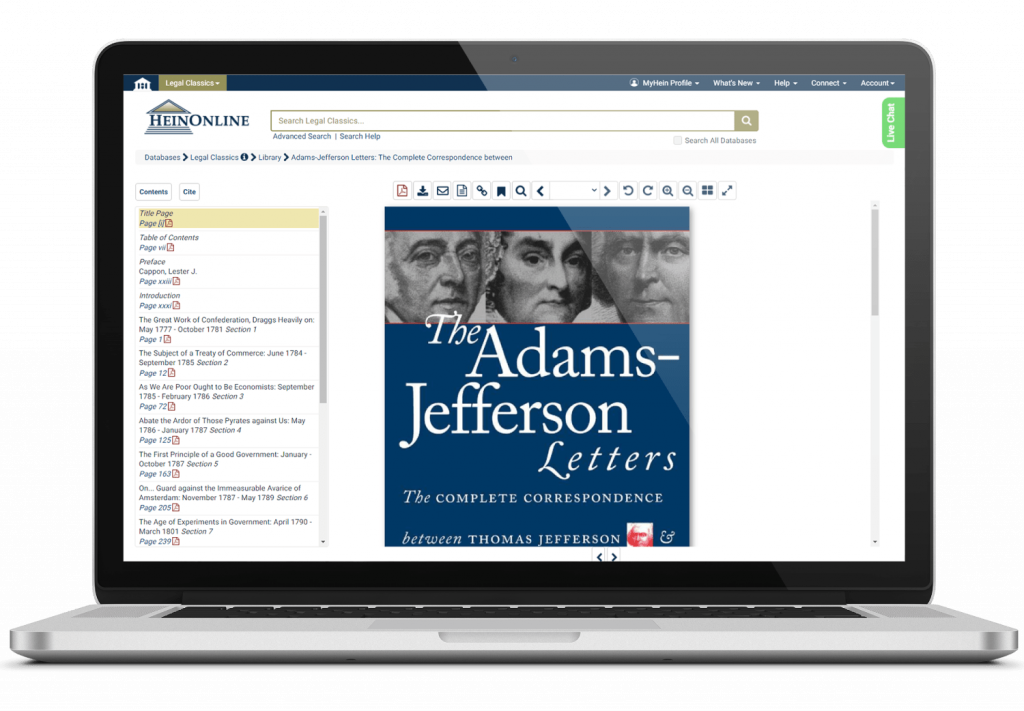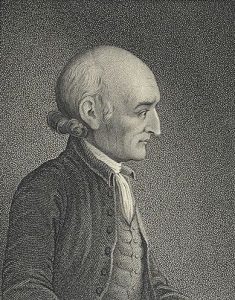NOW INCLUDES THE LAW ACADEMY PROJECT SUBCOLLECTION

Legal Classics
An extensive collection featuring thousands of works from some of the greatest legal minds in history.
21,502
TITLES
27,595
VOLUMES
13,136,774
PAGES

About Legal Classics
HeinOnline’s Legal Classics database offers more than 19,900 works from some of the greatest legal minds in history, including Joseph Story, Jeremy Bentham, William Blackstone, William Holdsworth, Henry Maine, Frederick William Maitland, Frederick Pollock, Louis Brandeis, Benjamin N. Cardozo, Edwardo Coke, and many more.
In addition to many “classics,” this database includes rare legal documents that are found in only a handful of libraries around the world. The database focuses on constitutional law, comparative law, political science, and other classic topics. Researchers may browse the titles by name, author, or subject.
Title List: KBART (TXT) | CSV | HTML
Featured Subcollections
The George Wythe Collection, composed of 160 titles, is now available in the Legal Classics database. Although the entire George Wythe Collection is much larger than 160 titles, the HeinOnline collection contains mainly law-related content. Assembled in 18th century Virginia, this collection includes Western classics on history, philosophy, science, mathematics, and law. The books directly impacted
the development of Virginia law and the law of the new nation.
About George Wythe
George Wythe was a Virginia judge, signatory of the Declaration of Independence, and Founding Father of the United States. In 1779, at the College of William & Mary, he became America’s first law professor. Among his apprentices were Thomas Jefferson, John Marshall, and Henry Clay. Close with Jefferson throughout his life, he bequeathed Jefferson his book collection, which Jefferson later sold to form the Library of Congress.
Bernard Schwartz (1923-1997) was a prolific legal scholar and historian, known especially for his work on American administrative and constitutional law as well as the Supreme Court. His works were intended for both his fellow lawyers and the lay public, seeking to illuminate for all the decision-making process of the Court and the reasoning of Justices as they issued their decisions.
Schwartz servered on the law faculty of New York University (NYU) for 45 years and was a Chapman Distinguished Professor of Law at the University of Tulsa. Over his career, Schwartz authored more than sixty books and hundreds of articles on a myriad of legal topics. In cooperation with the University of Tulsa, a sample of his works—digitized from his personal collection—are provided in HeinOnline’s Legal Classics database.
This subcollection features a host of teaching materials from Edgar Durfee and John Dawson on the study of remedies, as well as the never-before-published John R. Wilson work, Cases on Remedies.
The Law Academy Project aims to explore the Academy’s history from its beginnings to the mid-twentieth century. Within the database, users will find biographies of the Academy’s leading officers; course pamphlets; annual addresses from noted local, national, and international law experts; as well as other shorter pieces relating to the Academy.

The George Wythe Collection, composed of 160 titles, is now available in the Legal Classics database. Although the entire George Wythe Collection is much larger than 160 titles, the HeinOnline collection contains mainly law-related content. Assembled in 18th century Virginia, this collection includes Western classics on history, philosophy, science, mathematics, and law. The books directly impacted the development of Virginia law and the law of the new nation.
About George Wythe
George Wythe was a Virginia judge, signatory of the Declaration of Independence, and Founding Father of the United States. In 1779, at the College of William & Mary, he became America’s first law professor. Among his apprentices were Thomas Jefferson, John Marshall, and Henry Clay. Close with Jefferson throughout his life, he bequeathed Jefferson his book collection, which Jefferson later sold to form the Library of Congress.
Bernard Schwartz (1923-1997) was a prolific legal scholar and historian, known especially for his work on American administrative and constitutional law as well as the Supreme Court. His works were intended for both his fellow lawyers and the lay public, seeking to illuminate for all the decision-making process of the Court and the reasoning of Justices as they issued their decisions.
Schwartz served on the law faculty of New York University (NYU) for 45 years and was a Chapman Distinguished Professor of Law at the University of Tulsa. Over his career, Schwartz authored more than sixty books and hundreds of articles on a myriad of legal topics. In cooperation with the University of Tulsa, a sample of his works—digitized from his personal collection—are provided in HeinOnline’s Legal Classics database.
This subcollection features a host of teaching materials from Edgar Durfee and John Dawson on the study of remedies, as well as the never-before-published John R. Wilson work, Cases on Remedies.
The Law Academy Project aims to explore the Academy’s history from its beginnings to the mid-twentieth century. Within the database, users will find biographies of the Academy’s leading officers; course pamphlets; annual addresses from noted local, national, and international law experts; as well as other shorter pieces relating to the Academy.
